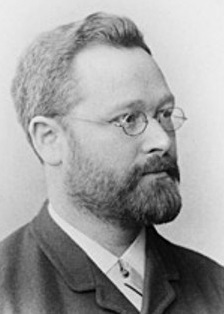Eduard Sievers facts for kids
Quick facts for kids
Eduard Sievers
|
|
|---|---|
 |
|
| Born | 25 November 1850 Lippoldsberg, Germany
|
| Died | 30 March 1932 (aged 81) Leipzig, Germany
|
| Nationality | German |
| Alma mater |
|
| Scientific career | |
| Institutions |
|
| Notable students |
|
Eduard Sievers was a very important German expert in languages. He was born on November 25, 1850, in Lippoldsberg, Germany, and passed away on March 30, 1932, in Leipzig.
He was known as a philologist, which means he studied languages, especially how they change over time. He focused on old languages like Anglo-Saxon and Old Saxon, which are early forms of English and German. Sievers was part of a famous group of language experts called the "Leipzig School." He helped us understand the poetry and sounds of ancient Germanic languages. He also discovered a rule about sounds in language, now known as Sievers' law.
Contents
His Life and Career
Eduard Sievers studied at universities in Leipzig and Berlin. He was a brilliant student. In 1871, he became a professor at the University of Jena. A professor is a high-level teacher and researcher at a university.
Five years later, he became a full professor there. This meant he was in charge of teaching and researching Germanic and Romance languages. Germanic languages include German, English, and Dutch. Romance languages come from Latin, like French, Spanish, and Italian.
Later in his career, he taught at other well-known universities. He worked at the University of Tübingen starting in 1883. Then, in 1887, he moved to the University of Halle. Finally, in 1892, he joined the University of Leipzig, where he continued his important work.
His Contributions to Language Study
Eduard Sievers wrote many books and articles about languages. His work helped other scholars understand how languages developed.
Key Books and Studies
- He wrote an important book called An Old English Grammar. This book helped people learn the rules of old English.
- He also studied old texts like Heliand, which is an old Saxon poem about the life of Jesus.
- His book Angelsächsische Grammatik was a detailed grammar guide for Anglo-Saxon.
- Sievers was also very interested in how sounds are made when we speak. He wrote Grundzüge der Phonetik, which was a standard book on phonetics. Phonetics is the study of speech sounds.
- He also looked at how poetry is structured. His Metrische Studien explored the patterns of rhythm in different languages, including Hebrew poetry.
As an Editor
Besides writing his own books, Sievers also helped edit important works by other scholars. He edited old texts like Tatian and Heliand. He also helped put together Die althochdeutschen Glossen, which was a collection of old German notes.
In 1891, he became an editor for a major journal about the history of the German language. He wrote sections on topics like runes (ancient alphabets), the Gothic language (an old Germanic language), and Germanic poetry. His work helped shape how people studied languages for many years.
See also
- Sievers' Theory of Anglo-Saxon Meter
- Sievers' law
- Hermann Paul
 | Delilah Pierce |
 | Gordon Parks |
 | Augusta Savage |
 | Charles Ethan Porter |

